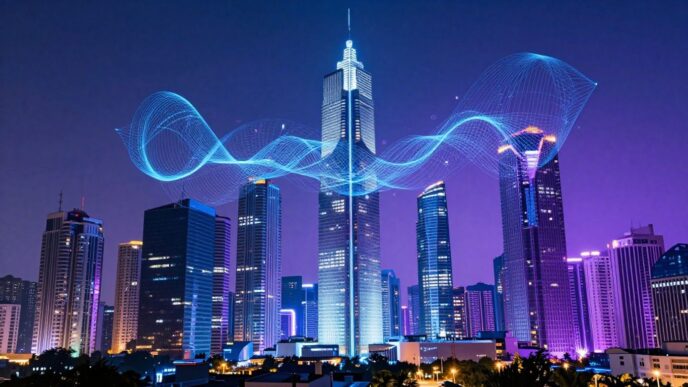In the rapidly evolving landscape of event management, staying at the forefront of technological advancements is no longer a luxury but a necessity for industry professionals. The fusion of cutting-edge technology with traditional event planning practices has ushered in a new era of immersive, data-driven, and highly personalized experiences. Event planners who embrace these innovations position themselves as leaders in an increasingly competitive field, capable of delivering events that not only meet but exceed the expectations of today’s tech-savvy attendees.
The integration of advanced technologies into event management processes offers a myriad of benefits, from streamlined operations and enhanced attendee engagement to unprecedented levels of data analytics and personalization.
As the industry continues to push boundaries, event planners must remain vigilant in adopting and mastering emerging technologies to ensure they can create experiences that are not just current, but truly cutting-edge.
This article explores five pivotal technology trends that are reshaping the event management landscape, providing insights into their applications, importance, and potential impact on the future of events.
- Artificial Intelligence (AI) and Machine Learning
Artificial Intelligence and Machine Learning are revolutionizing the event management industry by introducing unprecedented levels of efficiency and personalization. AI-powered tools are now integral to event planning, execution, and analysis, offering event organizers powerful capabilities to streamline their workflows and enhance decision-making processes.
Machine learning algorithms are at the forefront of this transformation, enabling personalization at scale and providing predictive analytics that were previously unattainable. These technologies significantly enhance efficiency in event planning and management by automating repetitive tasks and offering data-driven insights for better decision-making. Moreover, AI enables the creation of personalized attendee experiences, tailoring content, recommendations, and interactions to individual preferences and behaviors.
“One of the most visible applications of AI in events is the implementation of chatbots and virtual assistants” says events expert Dan Smith of Keynote Speaker. “These AI-driven interfaces improve attendee engagement by providing instant, 24/7 support, answering queries, and guiding participants through event schedules and activities. As AI continues to evolve, its role in shaping the future of event management will only grow more significant.”
- Virtual and Augmented Reality (VR/AR)
Virtual and Augmented Reality technologies are transforming the very nature of event experiences, blurring the lines between physical and digital realms. VR offers immersive virtual events and experiences that can transport attendees to entirely new environments, while AR enhances in-person events with digital overlays, adding layers of information and interactivity to the physical world.
The importance of VR/AR in event management cannot be overstated. These technologies create engaging and interactive experiences for attendees, significantly boosting engagement and memorability. VR, in particular, allows for global participation without the need for travel, breaking down geographical barriers and expanding event reach.
AR shines in enhancing product demonstrations and exhibitions, allowing attendees to interact with virtual products or visualize complex concepts in three-dimensional space. Furthermore, both VR and AR open up new avenues for sponsorship and branding, offering innovative ways for sponsors to engage with attendees and showcase their products or services.
- Event Apps and Mobile Technology
The ubiquity of smartphones has made event apps and mobile technology indispensable tools in modern event management. Comprehensive mobile applications now serve as central hubs for event information and interaction, offering features like digital ticketing, personalized scheduling, and networking functionalities.
“These apps significantly improve the attendee experience and engagement by providing easy access to event information, real-time updates, and interactive features” says event management expert John Rogan of Motivational Speaker. “They facilitate seamless communication between organizers and attendees, ensuring that participants are always informed about schedule changes, important announcements, or networking opportunities.”
Moreover, event apps provide a wealth of valuable data on attendee behavior and preferences, offering insights that can be used to improve current and future events. The networking capabilities of these apps are particularly noteworthy, enhancing opportunities for participants to connect, share information, and schedule meetings, thereby maximizing the value of their event experience.
- Contactless and Wearable Technology
In an era where health and safety concerns are paramount, contactless and wearable technologies have gained significant traction in the event management industry. RFID and NFC-enabled badges and wristbands are becoming standard, offering a range of functionalities from contactless check-ins to seamless payments and interactions.
These technologies enhance safety and hygiene at events by minimizing physical contact points. They streamline event entry processes, significantly reducing queues and wait times. Beyond logistical improvements, contactless and wearable tech enables seamless transactions and interactions throughout the event, enhancing the overall attendee experience.
From an organizer’s perspective, these technologies provide invaluable data analytics on attendee movement and engagement. This information can be used to optimize event layouts, improve crowd management, and provide insights into attendee preferences and behavior patterns.
- Live Streaming and Hybrid Event Solutions
The global shift towards digital experiences has catapulted live streaming and hybrid event solutions to the forefront of event management technology. High-quality live streaming platforms now offer virtual attendance options, while integrated solutions combine in-person and virtual event elements seamlessly.
The importance of these technologies lies in their ability to expand event reach to a global audience, transcending geographical limitations. They provide flexibility for attendees to participate remotely, catering to diverse preferences and circumstances. This increased accessibility and inclusivity open events to a broader audience, potentially increasing participation and engagement.
Furthermore, live streaming and hybrid solutions offer new revenue streams through virtual ticket sales, sponsorship opportunities, and on-demand content access. As the industry continues to evolve, the ability to deliver high-quality hybrid experiences will likely become a critical competency for event organizers.










